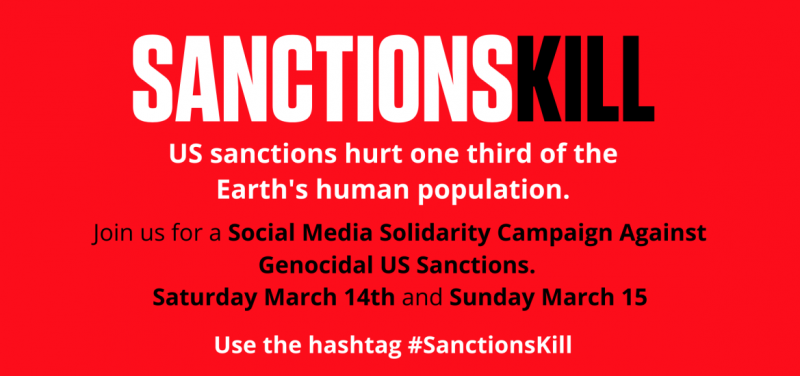
The era of so-called industrial deregulation and globalized free trade, whose icon was the World Trade Organization (established in 1994), has been grotesquely misshaped into an era of restrictive trade, and mean-spirited and often petty recriminations in the form of targeted sanctions exercised mainly by the NATO powers.
A strategy once applied with some sense of ethical constraint and purpose, although not so much efficacy, in the cases of Rhodesia and South Africa in the 1960s and 1970s, particularly in the aftermath of 9/11, has become an ill-considered, go-to, knee-jerk response by lazy foreign policy chiefs of imperial powers.
Even this narrative of sanctions history is suspect since it conveniently overlooks the comprehensive economic embargo imposed by the USA on Cuba in 1962 and strengthened in 1996, a crippling constraint on Cuban development ever since, even despite occasional modifications of restrictions.
Cuba of course remains a Communist country over 60 years later.
For every action there is a reaction.
The slapping-on of sanctions or – as in the case of US pretense of seriousness over “Wuhan Lab” origins of Covid, which has provoked threats of nuclear war by China – the fabrication of pretexts for sanctions provokes counter-productive responses, including import substitution and novel, more aggressive military, and trade alliances.
Western sanctions against Russia amidst a two-decade campaign of foolish demonization, have pushed Russia towards China, and western sanctions aggression against both Russia and China may well propel their consideration of a unified, Eurasian first-strike nuclear posture that capitalizes on Russia’s limited-time advance in hypersonic missiles, too late for a return of adults to the foreign policy playrooms of NATO powers.
Sanctions strike hard at the very essence of positive international relationship – trade – and are existentially counter-productive in the long term, except in those cases where the trade itself is self-evidently criminal and undesirable, and deemed to be such by respected international regulators, as in the case of slave trafficking.
Several basic principles govern the era of reckless western sanctions warfare that divides the major competing imperial powers and helps consolidate their alliances.
These are as follows:
(1) sanctions are mainly imposed by strong against weaker powers; where the disputants are closer to equality, as in US President Trump’s notorious trade war with China — which appears to have inflicted considerable damage to both parties – they create conditions ripe for global recession, even depression;
(2) sanctions may be imposed within democratic structures following democratic protocols as allowed for by the UN or WTO, but for their targets no democracy is required – they are imposed by fiat, only sometimes if rarely challenged in international courts;
(3) over time, the targets of sanctions have become more specific, more personal, not infrequently more petty, though not more just, nor less illogical;
(4) acquiescence to the sanctions imposed by big powers on weaker opponents is a measure of the loyalty of the empire’s vassals who are expected to imitate imperial sanctions in their own trading domains;
(5) while sanctions policies can be relatively benign, even effective in bringing about some desirable change of behavior, they not infrequently induce consequences that are as devastating as military attack and particularly vicious in their impacts on ordinary civilians of targeted countries;
(6) sanctions are rarely totally effective, are sometimes counter-productive, and sometimes spiteful, mean and criminal;
(7) sanctions regimes are excuses for arbitrariness, cruelty, the lustful seizure of assets, or the blocking of access to the means of self-defense, and other delinquencies of the international “rules-based order” demanded by imperial disorder.
Sanctions are the “gentlemanly” neo-imperial language of gunboat diplomacy, never better expressed than the attempts of the British government in the early 1950s to discipline a newly democratic Iran.
First the British Labour Government, then a Conservative government under a splenetic Churchill, tried to put a halt to the runaway popularity of Mohammed Mossadegh, prime minister of Iran, and his policy to shut down the Anglo-Iranian Oil Company and nationalize Iran’s own oil.
The British sabotaged their own company, refused to distribute the oil, and did everything else they could to impoverish Iran.
This was only after the AIOC had refused to budge from its insistence on taking practically all of the profits and to refrain from treating Iranian oil workers as subhuman.
Ironically, the British needed AIOC money to finance their own program of industrial nationalization and the welfare state.
As is so often the case, the “sanctions” merely hardened anti-imperial sentiment, and were succeeded by a joint US-UK directed regime-change coup d’etat
None of this need suggest a diminution in the importance of national sovereignty.
Sovereign nations should be free to trade with whomsoever they choose, to protect which domestic industries they consider worthy of protection.
That is their right.
They also have the right to enter into trade agreements with others for the purpose of regulating the conditions of trade between them, provided that they enter into such agreements without duress, bribery or punishment.
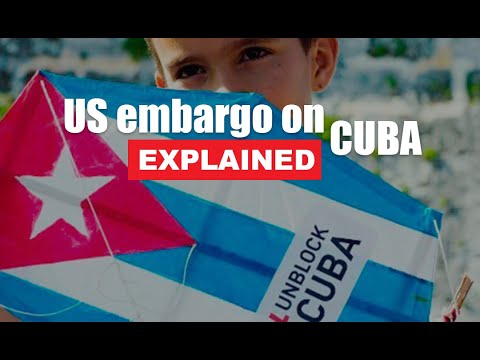
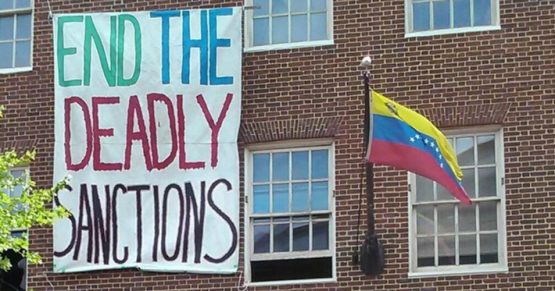
Questions of Definition
The term sanctions can refer to travel bans, asset freezes, arms embargoes, capital restraints, foreign aid reductions, and trade restrictions, and represent efforts to coerce, deter, punish, or shame entities that are considered by those who wield them to endanger their interests.
They are generally viewed as a lower-cost, lower-risk course of action in calculations that balance diplomacy against war.
Yet sanctions can be just as devasting in terms of loss of human life.
They may be particularly attractive in the case of policy responses to foreign crises in which national interest is considered less than vital, or where military action is not feasible.
Sanctions that blanket entire populations generally do most damage to poorer and more vulnerable social strata, who lack the means to avoid or compensate for their consequences.
The USA has more than two dozen sanctions regimes.
Some target specific countries such as Cuba and Iran, others target specific categories of person or institution or even specific named individuals.
Sanctions have been used in efforts of counterterrorism, counter-narcotics, nonproliferation, democracy and human rights promotion, conflict resolution, and cybersecurity.
They are frequently applied as a form of punishment or reprisal for behavior in which it is alleged that the target has engaged and of which the applying entity disapproves.
In the case of the UN Security Council sanctions resolutions must pass the fifteen-member council by a majority vote and without a veto from any of the five permanent members: the United States, China, France, Russia, and the United Kingdom.
The most common types of UN sanctions, binding for all member states, are asset freezes, travel bans, and arms embargoes.
The UN relies on member states for enforcement, with all the idiosyncrasies and abuses that this entails.
The council-imposed sanctions against Southern Rhodesia in 1966 were intended to undermine Ian Smith’s white supremacist regime and were followed in 1977 by another set of comprehensive UN sanctions against apartheid South Africa.
They have been applied more than twenty times since 1990 against targeting parties to an intrastate conflict, as in Somalia, Liberia, and Yugoslavia in the 1990s.
The European Union imposes sanctions as part of its Common Foreign and Security Policy.
They must receive unanimous consent from member states in the Council of the European Union, the body that represents EU leaders.
The EU has levied its sanctions more than thirty times.
Individual EU states may also impose harsher sanctions independently within their national jurisdiction.
The USA resorts to economic and financial sanctions more than any other country. Presidents may issue an executive order that declares a national emergency and invokes special powers to regulate commerce for a period of one year, unless extended by the president or terminated by a joint resolution of Congress.
Most of the more than fifty states of emergency declared by Congress remain in effect today.
Congress may pass legislation imposing new sanctions or modifying existing ones.
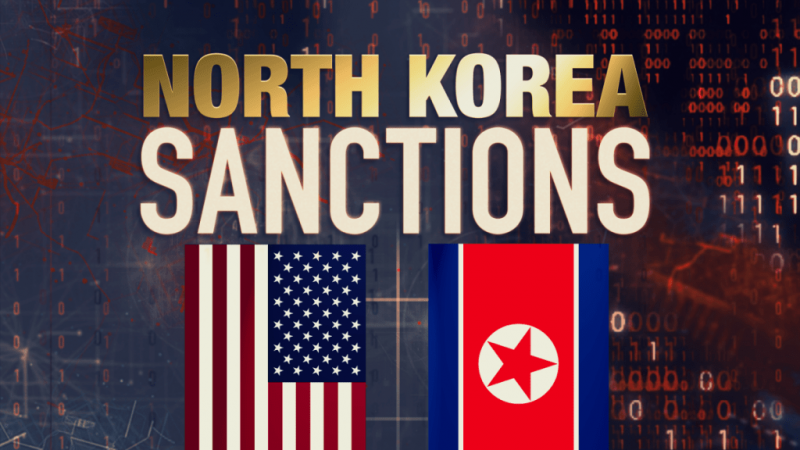
In 2019, the United States had comprehensive sanctions regimes on Cuba, North Korea, Iran, Sudan, and Syria, as well as more than a dozen other programs targeting individuals and entities (currently some 6,000).
Existing U.S. sanctions programs are administered by the Treasury Department’s Office of Foreign Assets Control (OFAC), while other departments, including State, Commerce, Homeland Security, and Justice, may also play an integral role.
The secretary of state can designate a group a foreign terrorist organization or label a country a state sponsor of terrorism, both of which have sanctions implications.
State and local authorities may also contribute to enforcement efforts.
The practice of sanctions received a significant boost with the formation of the World Trade Organization, which recognizes the legitimacy of sanctions as a response to the failure of parties in a trade dispute to reach agreement on satisfactory compensation.
A complainant may ask the Dispute Settlement Body for permission to impose trade sanctions against the respondent that has failed to implement.
The complainant’s retaliatory response may not go beyond the level of the harm caused by the respondent.
The complainant should first seek to suspend obligations in the same sector as that in which the violation or other nullification or impairment was found, unless the complainant considers it impracticable or ineffective to remain within the same sector
The complainant is allowed countermeasures that are in effect and would in other circumstances be inconsistent with the WTO Agreement.
In other words, the result is that a complainant responds to one trade barrier with another trade barrier, contrary to the liberalization philosophy underlying the WTO.
Such measures are nearly always harmful for both the complainant and the target.
Although such retaliation requires prior approval by the DSB 1, the countermeasures are applied selectively by one Member against another.
The suspension of obligations is temporary and the DSB is obligated to maintain a review of the situation for as long as there is no implementation.
The suspension must be revoked once the Member concerned has fully complied with the DSB’s recommendations and rulings.
In a 2019 decision the WTO allowed China to impose trade sanctions on $3.6 billion of American goods on the grounds that the USA had not followed WTO rules in the way it imposed duties on what it regarded as unfairly cheap Chinese goods.
The ruling concluded a case that China brought against the USA in 2013 that stemmed from levies placed on more than 40 Chinese goods.
At issue were subsidies that the USA accused China of providing to its companies so that they can sell goods more cheaply overseas.
The case touched on some of the deep politics of neoliberalism for which the WTO is supreme icon, and which make the very notion of sanctions problematic as evidenced in frequent criticisms of the WTO.
These are that free trade benefits developed countries more than developing countries; that countries should trade without discrimination means a local firm is not allowed to favor local contractors, giving an unfair advantage to multinational companies and imposing costs for local firms; it is important that nations be allowed to assist in the diversification of their economies and not be penalized for favoring emerging industries; free trade is not equally sought across different industries – notably, both the US and EU retain high tariffs on agriculture, which hurts farmers in developing economies; principles of free trade often ignore environmental considerations, considerations of labor equity and cultural diversity.
After 9/11 – still one of the least understood events in modern history – and amidst the subsequent US invasions of the sovereign countries of Afghanistan and Iraq, and de-stabilization of many others (including Libya, Syria, Ukraine), the USA set about disrupting what it deemed the financial infrastructure supporting terrorists and international criminals, (but not including the USA itself).
The Patriot Act awarded Treasury Department officials far-reaching authority to freeze the assets and financial transactions of individuals and other entities suspected of supporting terrorism, and broad powers to designate foreign jurisdictions and financial institutions as “primary money laundering concerns.”
Treasury needs only a reasonable suspicion—not necessarily any evidence—to target entities under these laws.
The centrality of New York and the dollar to the global financial system means these U.S. policies are felt globally.
Penalties for sanctions violations can be huge in terms of fines, loss of business, and reputational damage.
Sanctions regimes today increasingly impact not merely the primary targeted countries or entities but also those who would do business with such countries or entities.
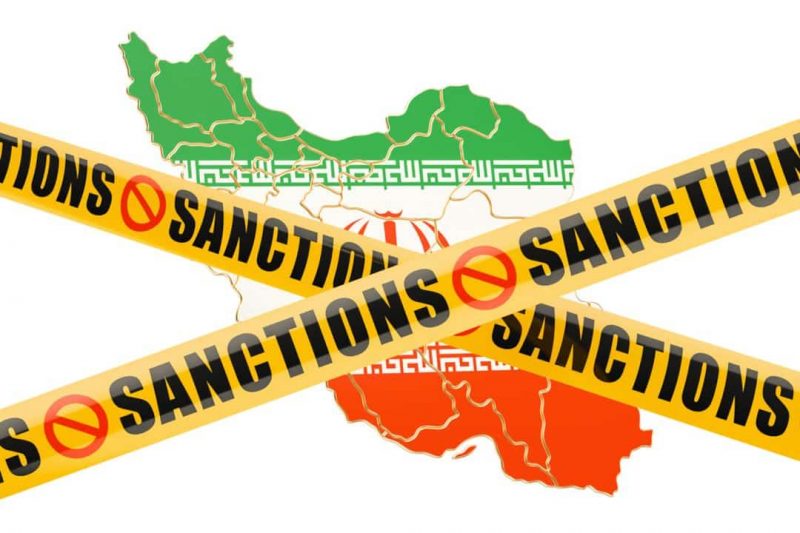
Questions of Effectiveness
Sanctions have a poor track record, registering a modest 20-30 percent success rate at best, according to one source, Emily Cashen, writing for World Finance in 2017.
According to leading empirical analyses, between 1915 and 2006, comprehensive sanctions were successful, at best, just 30 percent of the time.
The longer sanctions are in place, the less likely they are to be effective, as the targeted state tends to adapt to its new economic circumstances instead of changing its behavior.
Examples of “successful” applications of sanctions (always judged from the very partial viewpoint of those who impose them) are said to include their role in persuading the Iranian leadership to comply with limits to its uranium enrichment program.
But if this was “success,” why then did the USA break its agreement with Iran in 2018?
And why was there an agreement in the first place if Iran had never had nuclear weapons nor was likely to produce them on its own account without serious provocation.
Sanctions are also said to have pressured Gadaffi in handing over the Lockerbie suspects for trial, renouncing the nation’s weapons of mass destruction and ending its support for terrorist activities.
But then, if that was “success,” why did NATO bomb Libya back to the stone age in 2011?
Sanctions that are effective in one setting may fail in another.
Context is everything. Sanctions programs with relatively limited objectives are generally more likely to succeed than those with major political ambitions.
Furthermore, sanctions may achieve their desired economic effect but fail to change behavior.
Only correlations, not causal relationships, can be determined.
The central question is one of comparative utility: Is the imposition of sanctions better or worse than not imposing sanctions, from whose viewpoint, and why?
Best practices are said to combine punitive measures with positive inducements; set attainable goals; build multilateral support; be credible and flexible: and give the target reason to believe that sanctions will be increased or reduced based on its behavior.
In cases where the targeted country has other trading options unilateral measures have no real impact or may be counterproductive. Sanctions against Russia over Ukraine may have simply helped to push Russia closer to its eastern neighbors, notably China.
For several countries in western Europe, the sanctions had a double-edged sword.
Russia is the European Union’s third largest commercial partner, and the EU, reciprocally, is Russia’s chief trade partner, accounting for almost 41 percent of the nation’s trade prior to the sanctions.
In 2012, before the Ukrainian crisis began, the EU exported a record €267.5bn ($285bn) of goods to Russia.
Further, US sanctions against Russia increasingly and patently had nothing to do with Ukraine and everything to do with US interest in exploiting its imperial relationship with West European vassal states to grow its LNG (liquefied natural gas) market in competition with Russia, and by doing everything possible to obstruct – and to coerce European nations into helping it obstruct – Russia’s Nord Stream 2 oil and gas pipeline that will bring cheap Russian oil to Europe without passing through Ukraine.
The very opposite of principles of globalization and free trade.
The USA can afford to be aggressive in sanctions policies largely because (for the time being, and that time is getting shorter by the day) there is no alternative to the dollar and because there is no single country export market quite as attractive (for now and even then, one must wonder about China) as the USA.
Sanctions that are effective in one setting may fail in another.
Context is everything.
Sanctions programs with relatively limited objectives are generally more likely to succeed than those with major political ambitions.
Furthermore, sanctions may achieve their desired economic effect but fail to change behavior.
Only correlations, not causal relationships, can be determined.
The central question is one of comparative utility: Is the imposition of sanctions better or worse than not imposing sanctions, from whose viewpoint, and why?
Best practices are said to combine punitive measures with positive inducements; set attainable goals; build multilateral support; be credible and flexible: and give the target reason to believe that sanctions will be increased or reduced based on its behavior.
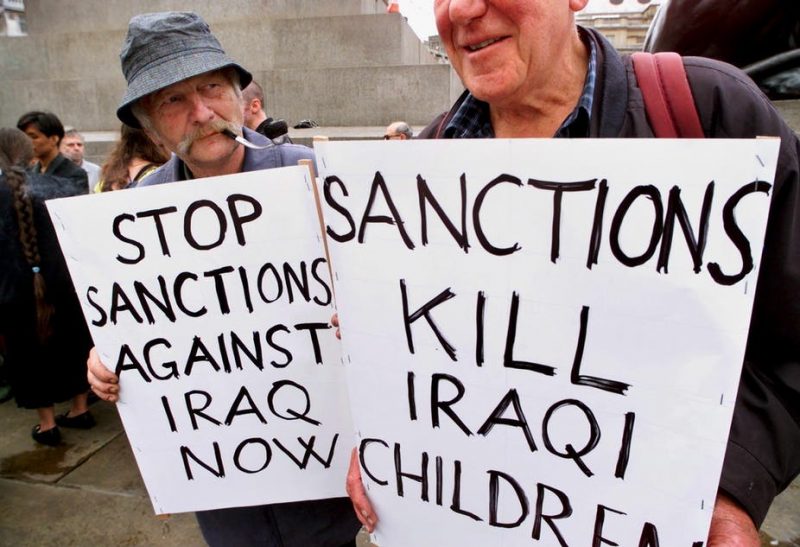
Sanctions and Human Misery
Since the early 1990s, the US, Europe and other developed economies have employed sanctions on other nations more than 500 times, seeking to assert their influence on the global stage without resorting to military interventions.
Yet military interventions tend to happen in any case suggesting that in some cases the sanctions are intended to “soften up” the target prior to armed conflict).
The economic stranglehold of stringent sanctions on Iraq after the successful allied invasion of 1991 caused widescale malnutrition and prolonged suffering, and a lack of medical supplies and a shortage of clean water led to one of the worst humanitarian crises in modern history.
Sanctions all but completely cut off the oil trade.
Iraq lost up to $130 billion in oil revenues during the 1990s, causing intense poverty to many Iraqi civilians.
Prior to the embargo, Iraq had relied on imports for two thirds of its food supply.
With this source suddenly cut off, the price of basic commodities rose 1,000 percent between 1990 and 1995.
Infant mortality increased 150 percent, according to a report by Save the Children, with researchers estimating that between 670,000 and 880,000 children under five died because of the impoverished conditions caused by the sanctions.
During the Gulf War, almost all of Iraq’s essential infrastructure was bombed by a US-led coalition, leaving the country without water treatment plants or sewage treatment facilities, prompting extended outbreaks of cholera and typhoid.
Targeted sanctions can be equally devastating.
The loss of income resulting from this mass redundancy has had a severe impact on child health in the nation, with conservative estimates recording a 143 percent increase in infant mortality.
Despite an international shift away from comprehensive sanctions, this Congolese suffering indicates targeted measures are still not free from ethical quandaries.
Application of sanctions became more popular at the end of the first cold war because previously targeted nations could negotiate for relief with the oppositional superpower.
In the succeeding era of greater enthusiasm for sanctions it became clear that they could have dire consequences for civilian populations, and this helps account for increased popularity of targeted sanctions.
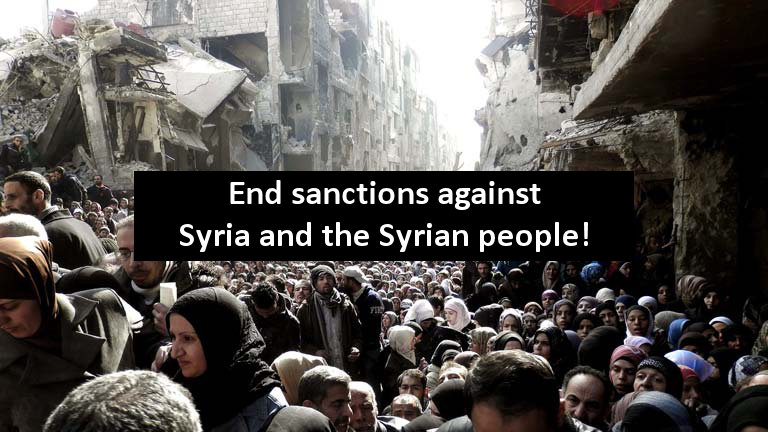
Sanctions of Spite: Syria and the Caesar Act
There are many current examples of the murderous horror of the impact of sanctions by “civilized,” usually western powers, especially when their targets are poorer countries such as Venezuela and Syria.
Not untypically, some of the behaviors that the imperialists seek to change are themselves the consequence of past imperial aggression.
The secular regime of Bashar Assad in Syria has faced a ten-year existential threat from the Muslim Brotherhood, Al Qaeda affiliates, ISIS and other jihadist entities supported by an array of global and regional actors including the USA, UK, and other NATO members, Israel, Jordan, Qatar, Saudi Arabia, Turkey, and the UAE.
Whatever the regime’s defects they are at the very least comparable and in some cases dwarfed by those of many of Syria’s opponents in the Arab world.
The significance of genuine popular support for Assad, demonstrated in numerous polls, has been marginalized by western mainstream media.
The regime’s survival, with air support from Russia and ground support from Hezbollah and Iran, is extraordinary by any measure.
Yet the USA has continued to interfere in the affairs of Syria with a view to its continuing impoverishment and destabilization by allowing Turkey to occupy large areas of the north west and populate these with jihadist emigrees; funding Kurdish forces to secure Syria’s oil resources on behalf of the USA, and for maintaining prisons and camps for ISIS supporters, by maintaining its own military bases; and permitting a constant succession of Israeli bombing attacks on what Israel claims are Iranian-backed militia or Syrian Arab Army militia working in collaboration with Iran; and approving further Israeli incursions into the Golan Heights.
Defeat of ISIS and recovery of non-Kurdish areas outside of Idlib by the Syrian Arab Army (SAA) took place in conditions of considerable economic challenge, exacerbated by US-imposed sanctions against both Syria and its neighbor Lebanon.
This had a corrosive impact on relations among top regime figures.
Bashar al-Assad’s billionaire first cousin and richest man in Syria, Rami Makhlouf, complained in early 2020 of regime harassment and arrests of employees.
Until then, the Makhlouf family enjoyed exclusive access to business opportunities and monopolies on hotels, tobacco, and communications, partly camouflaged by a philanthropic empire that assisted many Syrians through the conflict.
Some $30 billion of the country’s wealth, representing 20% of all deposits in Lebanese banks, was trapped by Beirut’s financial implosion, exacerbated by the unprecedented explosion – possibly accidental, possibly sabotage – in the city’s harbor area on August 4.
Syrian businessmen needed Beirut’s banks to conduct business abroad, and to evade sanctions.
A regime crackdown on money transfer companies made matters worse by creating a dollar shortage, depriving thousands of families who were dependent on foreign remittances.
Before the explosion, purchasing power of the Syrian pound was already worth 27 times less than before the start of the conflict.
Deteriorating economic conditions ravaged Syria’s surviving pretensions to socialist principle.
In the first decade of Bashar’s rule, there had been big gains in healthcare in terms of available beds, hospitals, and nursing staff.
But by now there were 50% fewer doctors, 30% fewer hospitals.
Before the conflict, 90% of pharmaceutical needs were filled by Syrian factories.
By 2018 those factories which remained had trouble getting raw materials and replacement parts for equipment because of sanctions.
Before the conflict there was improved land irrigation and food security.
In 2011, abject poverty stood at less than one percent, rising to 35 percent by 2015.
The percentage of those facing food insecurity had fallen from 2.2% in 1999 to 1.1% in 2010.
Now, 33% lacked food security.
One third of homes were damaged or destroyed, 380,000 killed and 11 million displaced since 2011.
Economic conditions were worsened by ever tightening economic sanctions and US enforcement of the so-called Caesar Act from June 2020 (named after a faked human rights scandal in 2015).
The Caesar Syria Civilian Protection Act sanctioned the Syrian government, including President Bashar al-Assad, for alleged war crimes.
The purposes were to cripple Syria for the purposes of regime change, while luring Russia further into the Syrian quagmire.
The Act targeted 39 individuals and entities, including the president’s wife, Asma.
Anyone doing business with the regime, no matter where, was potentially vulnerable to travel restrictions and financial sanctions.
The Caesar Act smeared the Syria Central Bank as a ‘money laundering’ institution and sought to render it impossible for Syrian companies to export and import from Lebanon.
It made it difficult or impossible for Syrians abroad to transfer money to family members.
The Act contributed to devaluation of the Syrian pound which tumbled from 650 Syrian pounds to one US dollar in October 2019 to 2600 to the US dollar in summer 2020.
The Caesar Act (alongside legal initiatives in Europe designed to charge senior administration officials with war crimes) were designed to stymie reconstruction, hit the construction, electricity, and oil sectors, and cripple the Lebanese private companies that would otherwise lead reconstruction efforts.
Sanctions prevented non-U.S. aid organizations from assisting reconstruction.
An opposition leader predicted it would result in “even greater levels of destitution, famine, and worsening criminality and predatory behavior” and would precipitate regime change, migratory flight, excess deaths, and youth deprivation.
In a climate of regulatory confusion, sanctions often encourage over-compliance.
Prospects of reconstruction investment funds from Russian companies were negatively impacted.
Blumenthal ascribed responsibility for the Caesar sanctions initiative to a “years-long lobbying campaign carried out by a network of regime-change operatives working under cover of shadowy international NGOs and Syrian-American diaspora groups.”
The country had already suffered severe US and EU economic sanctions. A 2016 UNESCO report found that sanctions had brought an end to humanitarian aid because sanctions regulations, licenses, and penalties made it so difficult and risky (Sterling 2020).
In 2018, United Nations Special Rapporteur, Idriss Jazairy, observed that sanctions impacted negatively on
After 500,000 civilians returned to Aleppo following its liberation in 2016, US sanctions and UN rules prohibited reconstruction.
Returnees were allowed “shelter kits” with plastic but rebuilding with glass and cement walls was not allowed because ‘reconstruction’ was prohibited.
In brazen acknowledgment of US support for the HTS terrorists of Idlib, the Caesar Act exempted Idlib province, as well as the northeast areas controlled by US troops and the SDF.
It designated $50 million for ‘humanitarian aid’ to these areas.
Other US allies pumped in hundreds of millions of dollars more in aid, further exacerbating pressure on the Syrian pound and substantially increasing prices for all commodities in regime-controlled areas.
Syria experts Joshua Landis and Steven Simon critiqued the logic of US sanctions policy, arguing that the:
“best-designed sanctions can be self-defeating, strengthening the regimes they were designed to hurt and punishing the societies they were supposed to protect.”
They recalled the destruction of Iraq’s middle class in the 1990s, when US sanctions killed hundreds of thousands of Iraqis:
“Their effect was gendered, disproportionately punishing women and children. The notion that sanctions work is a pitiless illusion.” .
Several European nations (Italy, Poland, Austria, Greece, Hungary) indicating unease with the continuing stagnation of US and EU sanctions policy, restored tacit contacts with Damascus.
While the EU was an important source of humanitarian aid for internally displaced people in Syria and for displaced Syrians abroad, it continued to refrain from dealing directly with Damascus or from support for reconstruction efforts, on the grounds of continuing instability.
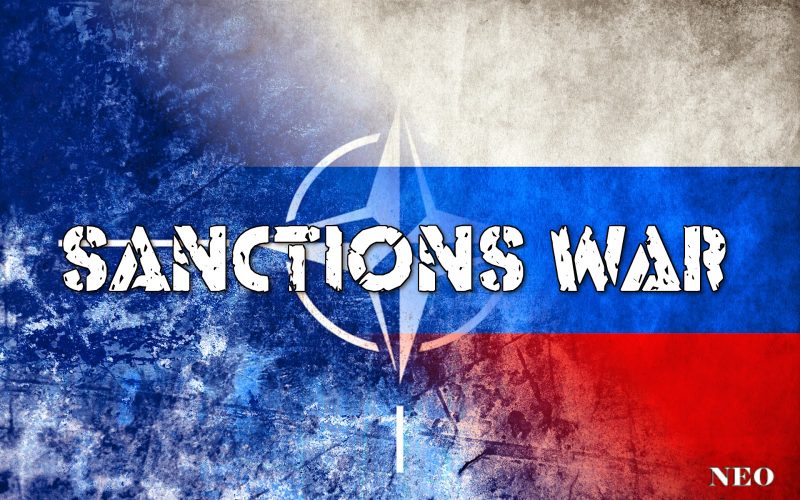
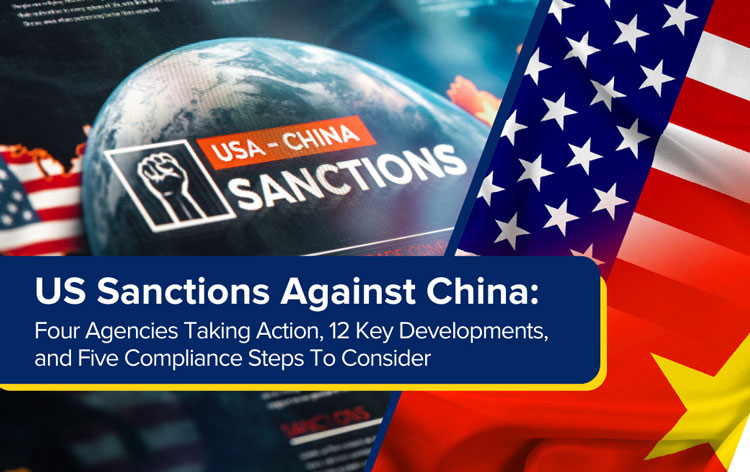
Conclusion
Under indubitably wise international leadership, acting within a framework of equitable political power among nation states whose sovereignty is sacrosanct, then perhaps sanctions policies might sometimes be strategically appropriate.
These conditions clearly do not apply.
The increasing weaponization of sanctions is a powerful contribution to a crumbling world order, one that invokes the grave danger of over-reaction by an aggrieved victim, in a context of intense economic and military competition between rival nuclear powers.
***
Oliver Boyd-Barrett is Professor Emeritus at Bowling Green State University, Ohio, and at California State Polytechnic University, Pomona. He is an expert on international media, news, and propaganda. His writings can be accessed by subscription at Substack at https://oliverboydbarrett.substack.com.
Published by The Unz Review
Published by The 21st Century
The views expressed in this article are solely those of the author and do not necessarily reflect the opinions of 21cir.
